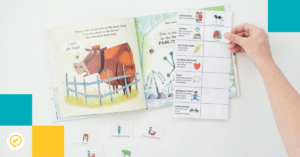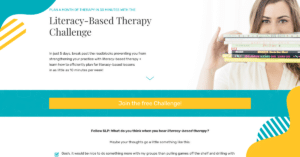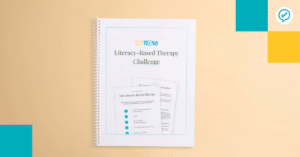Listen on Apple Podcasts Listen on Spotify
This Week’s Episode: Literacy-Based Therapy Ideas for Secondary Students
In this week’s episode of the SLP Now podcast, Marisha shares therapy plans for secondary learners with a nonfiction article unit. Marisha breaks down her planning process and shares practical and engaging therapy activities for literacy-based therapy.
Here’s what we discussed:
[2:19] Therapy Ideas for Step 1 (Pre-Story Knowledge Activation)
[4:25] Therapy Ideas for Step 2 (Reading)
[4:45] Therapy Ideas for Step 3 (Post Story Comprehension)
[5:43] Therapy Ideas for Step 4 (Skill Practice)
[8:00] Therapy Ideas for Step 5 (Parallel Story)
Want to hear more about this topic? Click here for all things literacy-based therapy!
Links Mentioned
Add links (set to open in new tab)
– The SLP Now One-Page Literacy-Based Therapy Unit Planner
– ReadWorks Article: The Health Benefits of Apples
– EdPuzzle: Virtual Field Trip
– Summarizing Visual and Literal & Inferential Questions: Included in the SLP Now Membership
– Record a YouTube Video
– Check out this webinar for more info on teletherapy: How to Implement Digital Literacy-Based Therapy
Subscribe & Review in iTunes
Are you subscribed to the podcast? If you’re not, subscribe today to get the latest episodes sent directly to you! Click here to make your listening experience auto-magic and as easy as possible.
Bonus points if you leave us a review over on iTunes → Those reviews help other SLPs find the podcast, and I love reading your feedback! Just click here to review, select “Ratings and Reviews,” “Write a Review,” and let me know what your favorite part of the podcast is.
Thanks so much!
Transcript
Marisha: With my older students, I like to use a nonfiction unit and granted... So I use three types of texts with my students. So I use a picture book for early elementary. And then as the students get too old for the picture book, I'll switch to a fiction article. And then one students get a little bit older and as they get more advanced with their skills, I like to switch to a nonfiction or an expository text because that's what they're expected to learn and understand in the classroom. However, I want to make sure that they have a good foundational knowledge of story grammar because the research on narratives and story grammar is just phenomenal. It is so impressive. How big of an impact teaching students story grammar can have. And it's such an important skill in terms of being able to communicate with family and friends and tell stories, but it also makes a huge difference with comprehension in general.
So it's an amazing skill to target. But once they have good foundation knowledge and they've mastered that I like to move to expository texts, because like I said, that's what they are doing in the classroom. So this is typically what... I mean, it depends on the level of the student. I've done this with upper elementary students, but I think it's appropriate... The nonfiction texts can be appropriate through 12th grade because it targets a lot of relevant skills for that population.
So here we go. So for the first, this is going to sound very similar to the early plans, just with a couple adjustments. So instead of reading a book we're reading an article, and that article is available on... The example that we're talking about today is available on ReadWorks, which is a free site with tons and tons of amazing articles that look fabulous. And they just have a lot of high interest topics.
And then as we talked about before, with pre-story knowledge activation, this article is about the health benefits of apples. And maybe they have trouble with some of the health vocabulary, so we can talk through some of that. With older students it's also... I wouldn't necessarily pre-teach categories or basic concepts or anything like that. But with older students, I find that selecting... Especially the tier two vocabulary from the unit and pre-teaching that, is a very helpful pre-story knowledge activation activity. If they don't have a good framework around apples, if they're not familiar with them, which hopefully they are, if we're at this level. But we might do a virtual field trip to an apple orchard, just to talk about how apples grow and how they get to the store and all of that.
So those are some things that we could do for step one. And it's obviously an expository text, so we won't be able to fill out the story grammar organizer. But we might be able to fill in a summarizing visual, just talking about, so what's the main thing that we think they're going to say about apples? And what details would they tell us about that? So that's a way to modify the activity I talked about for story grammar.
And then for step two, we would go through and read the article. So we would just take a couple minutes to do that. And then another thing that we can do for... So that's step two. Then for step three, we could go through some literal questions if that's appropriate for the students. Or we can do some inferential questions, we can also dive into different levels of questioning and get into more discussion here. So we're really diving into a variety of language skills. We can talk about cause and effect. We can work on identifying the main idea and supporting details as part of the comprehension activity. And I really like using an interactive organizer for that, and it just helps. I give the students some different options, because this is a really challenging skill to tackle. So I find that giving them options, a field of choices is a good way to scaffold that skill. So that's what we would do for step three.
For step four, we would dive into focus, skill activities. So in my units, I like to break down all of the most common skills that I target with that age group. So maybe there's still some residual grammar, especially if it comes to more of the syntax types of goals, like producing more complex sentences. Or maybe there's passive voice or adverbial classes or relative clauses. Those are some types of skills we might work on. Or prefixes and suffixes and making vocabulary journals for those, like we did with the categories and object functions for the younger students. Really working on multiple meaning words. So a couple examples of activities that we can use to target multiple goals. We can do compare and contrast to work on vocabulary, but then we can also use that... It's a great, fabulous activity for syntax schools like producing compound and complex sentences.
I had a lot of students who worked... Or not a lot, but a handful of students who worked on fact versus opinion. So that was a great activity. I'd give them a sentence, they'd identify why it was a fact or an opinion. And maybe the student working on grammar would have to explain why using an appropriate sentence. And then the student... Maybe the sentences include grammar targets, so the other student has to work on defining the vocabulary or using their vocabulary words in a sentence. So there's lots of ways to integrate these skills in meaningful activities and just switch things up. And if we're just trying to get tons of meaningful opportunities for vocabulary, we've already done a ton of discussion, meaningful language activities. I'm not beyond setting up a jeopardy game or a spinner with their targets and doing it that way. But there's so many amazing activities that we can be doing for that.
And then just to wrap things up. For the later students, a parallel story, I really like recording videos. So they can pretend that they're news newscasters or all the older kids want to be YouTubers. So we can pretend that we're going to make a YouTube video to teach people about the benefits of apples. And like I said before, I have them fill in an organizer and really practice whatever they're going to say in the story or in their summary and their explanation. Before they get to do the fun activity of pulling out the camera or making an animated video. But that really helps with the engagement and it results in a really cool work sample that they can take home and share with their family. So it's super fun and really effective and engaging.
Sign up to receive email updates
Enter your name and email address below and I'll send you periodic updates about the podcast.




Reader Interactions